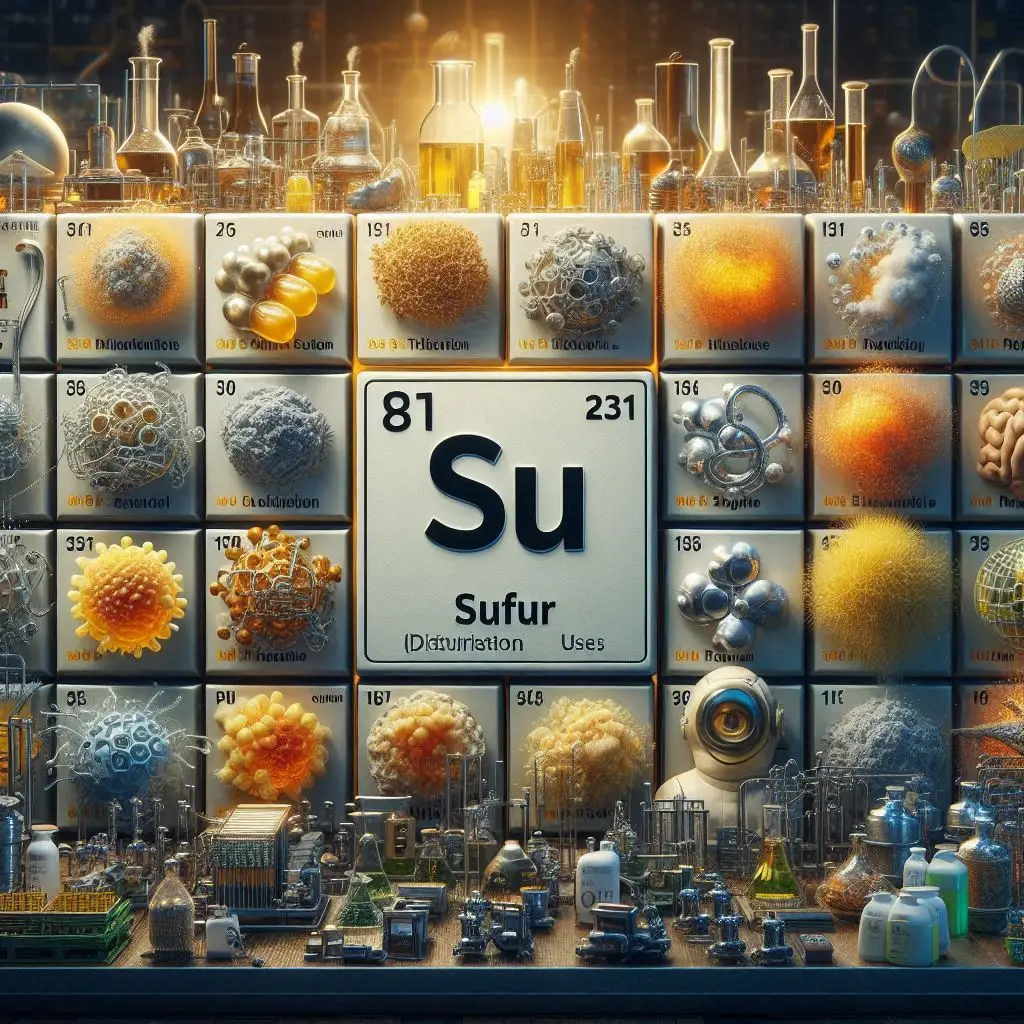
Sulfur periodic table
In this exploration, sulfur periodic table, I will look into the characteristics, distribution, uses, and importance of sulfur.
The versatile and plentiful element sulfur is essential to many facets of our life. Sulfur has a significant role in biological processes and has a broad range of uses in industry, agriculture, and healthcare. It is a crucial element of contemporary civilization. It is a contrast factor that has both favorable and unfavorable effects on the environment. It is a constant struggle to weigh the advantages of sulfur against any possible environmental impact. However, as we learn more about sulfur's characteristics and uses in many industries, we may innovate and raise the standard of living for people all over the globe.
Sulfur is a chemical element with the atomic number 16 and the symbol S that may be found in the periodic table. It is a non-metal and a member of group 16, also known as the oxygen group. Sulfur is a necessary component of life and is utilized extensively in a variety of industrial operations. It also plays important roles in a number of biological processes.
Characteristics of sulfur
Numerous chemical and physical characteristics are shown by sulfur. It exists as a solid at ambient temperature and has a variety of allotropes, the most prevalent of which is a yellow crystalline solid. Sulfur exists in a number of allotropes, including long-chained polymeric forms, S8 rings, and S6 rings. These allotropes each have unique physical characteristics including various melting points and solubilities.
The distinctive odor of sulfur is often connected to the stench of rotting eggs. This smell is caused by hydrogen sulfide gas (H2S), which is created when sulfur-containing organic matter is broken down by microbes. Despite having a terrible smell, sulfur is essential for life since it is a component of proteins, vitamins, and amino acids.
Occurrence:
Sulfur is extensively dispersed and the tenth most prevalent element in the crust of the Earth. Both its elemental form and compounds may be discovered. Sulfur is often found in the following places:
Sulfur is discharged into the atmosphere as a result of volcanic eruptions. This sulfur dioxide (SO2) may create sulfuric acid (H2SO4) when it interacts with atmospheric moisture, which contributes to acid rain.
Sulfide Minerals: Minerals like pyrite (FeS2) and galena (PbS) often contain sulfur. These minerals serve as significant sources of sulfur for use in industry.
Natural gas impurities that include hydrogen sulfide must be eliminated since they are poisonous and corrosive. Natural gas often contains these impurities.
Sulfur is a crucial component of many chemical compounds, including coenzymes, vitamins (like thiamine), and amino acids (like cysteine and methionine).
Salt Domes: In certain areas, sulfur builds up in subterranean salt domes, which are mined to produce sulfur.
Biological Processes: Microbial sulfur metabolism and the breakdown of organic matter are two biological processes that include sulfur cycling across ecosystems.
Applications:
Due to its complex chemical characteristics, sulfur has a broad variety of uses in a variety of sectors. The following are some of the most prominent applications:
Fertilizers: To increase crop yields, soil conditioners and fertilizers containing elemental sulfur are employed in agriculture. Additionally, it may be transformed into sulfuric acid and used to make phosphate-based fertilizers.
Chemical Production: One of the most frequently utilized compounds worldwide is sulfuric acid (H2SO4). It is essential to the manufacture of several compounds, including those that are used to make explosives, detergents, and synthetic fabrics.
Petroleum Refining: In order to comply with environmental requirements and enhance the quality of petroleum products, sulfur compounds in crude oil, such as hydrogen sulfide and mercaptans, must be eliminated.
Pharmaceuticals: Compounds containing sulfur are essential to the pharmaceutical sector. For instance, the molecular composition of penicillin and many other antibiotics includes sulfur.
Food Processing: The food business uses sulfur dioxide (SO2) as an antioxidant and preservative. It aids in stopping the oxidation of food items and the development of harmful microbes.
Sulfur is necessary for the vulcanization of rubber, which increases its elasticity and durability.
Environmental Remediation: To remove heavy metals from contaminated soils and water, sulfur compounds may be utilized in environmental remediation projects.
Mining: Sulfur is used to separate precious metals from other metals during the extraction of certain metals from ores, including copper and zinc.
Significance:
Sulfur's importance to our globe cannot be emphasized. As a crucial component of proteins and amino acids, the building blocks of living things, it is a necessary factor for life. The structure and operation of enzymes, which are necessary for a variety of biological activities, depend on sulfur.
Sulfur in agriculture is essential for enhancing soil quality and fostering plant development. Its use in soil conditioners and fertilizers aids in boosting crop yields and resolving issues with food security. Additionally, the use of sulfur in the manufacture of medicines and antibiotics has significantly improved healthcare and saved many lives.
Due to its broad application in several chemical processes, sulfuric acid is sometimes referred to as the "king of chemicals" in the industrial sector. It is essential to the operation of many companies and serves as the foundation for the creation of a broad variety of goods, from plastics to detergents. Additionally, the use of sulfur in the refining of petroleum has improved the quality of fuels and decreased environmental pollution.
On the negative side, air pollution and acid rain have been caused by sulfur emissions from numerous industrial operations, mainly the burning of fossil fuels. The ecosystem has been preserved and these issues have been mitigated in large part because to efforts to limit sulfur emissions.

